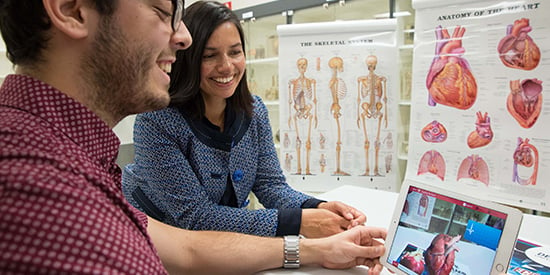Rural medical students perform on par with urban peers: Deakin study
Media release
A new Deakin University study into the outcomes of its medical students has shown those from rural areas perform just as well as their metropolitan peers, even if they enter the postgraduate course with a slightly lower grade point average.
The study's authors say encouraging more rural students into medicine is critical as they are more likely to become country-based doctors, and giving application bonuses to those from a rural background is therefore a fundamental way to address the uneven distribution of Australia's medical workforce.
The study, recently published in the Australian Journal of Rural Health, looked at almost 150 of Deakin's medical graduates, which included a quarter from a rural background.
It found no substantial difference in the academic results between the two groups, despite rural students entering the post-graduate course with slightly lower grades, on average, from their previous degree.
Study co-author Dr Karen D'Souza, a senior lecturer at the Deakin Medical School, said the finding was validation that special rural entry bonuses worked to give opportunities to promising students who might otherwise miss out.
"We really need more rural doctors, and to do that we have to get more people from a rural background into medicine," she said.
"But the selection processes to medical school are highly competitive, with applications far exceeding the number of places available, potentially disadvantaging rural applicants."
Dr D'Souza said there were application bonuses used to encourage a diverse group of students into Deakin's medicine program.
"Entry into a postgraduate medical course such as Deakin's requires a certain grade point average (GPA) from an undergraduate degree, passing of the Graduate Medical School Admission Test (GAMSAT) and then an interview," she said.
"Those from regional and rural areas, or from a disadvantaged background, are able to receive some bonuses to their GPA and GAMSAT scores when they apply.
"These students can often be the first in their family to go to university. They may have to live out of home and work while completing their first degree. So there are a number of factors that could contribute to that slightly lower GPA. They're also much more likely to be at financial disadvantage.
"But what we see is that the admission scores on the GAMSAT and interview are pretty similar between the country and city applicants. And what this new research shows is that once they get into medicine they do just as well as those from the city, which is the most important thing."
Dr D'Souza said it was critical that students from rural areas were given access to medical programs, as evidence showed they were more likely to go on to fill much-needed gaps in rural healthcare once they graduated.
“We really don't want to be missing any of those students with a passion for regional health because their GPA is slightly lower," she said. "We know once they get in they're absolutely fine."
About a quarter of Deakin's medicine cohort comes from what the university classifies as a rural background, and Dr D'Souza said the university had an enormous focus on regional and rural healthcare.
"Our program was set up to produce work-ready graduates that would service regional and rural communities," she said.
"All our students complete their first two years of study in the regional centre of Geelong. Then we have clinical schools in Warrnambool, Ballarat and Geelong servicing regional and rural areas. Our Rural Community Clinical School places students in GP practices in rural communities across western Victoria.
"So they are working and living in those communities, and that exposure in a meaningful way means they are more likely to go on to be rural or regional doctors."

